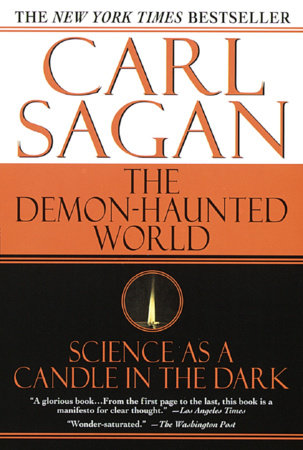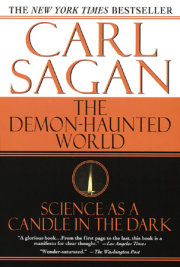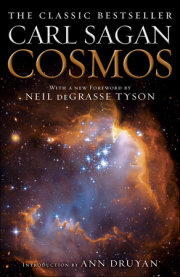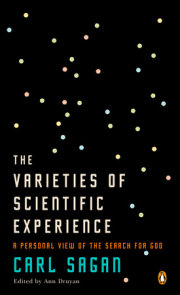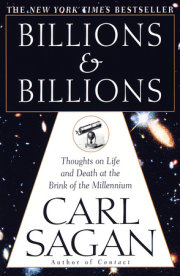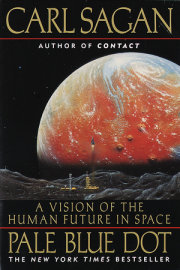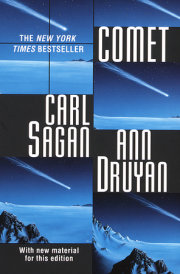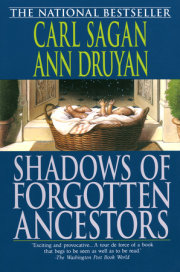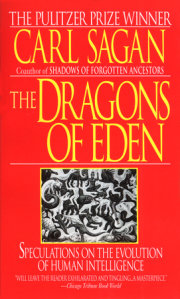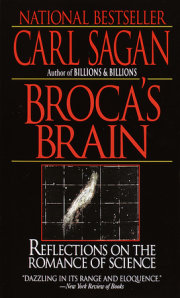Chapter 1
THE MOST PRECIOUS THING
All our science, measured against reality, is primitive and childlike—and yet it is the most precious thing we have.
ALBERT EINSTEIN
(1879–1955)
As I got off the plane, he was waiting for me, holding up a scrap of cardboard with my name scribbled on it. I was on my way to a conference of scientists and TV broadcasters devoted to the seemingly hopeless prospect of improving the presentation of science on commercial television. The organizers had kindly sent a driver.
“Do you mind if I ask you a question?” he said as we waited for my bag.
No, I didn’t mind.
“Isn’t it confusing to have the same name as that scientist guy?”
It took me a moment to understand. Was he pulling my leg? Finally, it dawned on me.
“I am that scientist guy,” I answered.
He paused and then smiled. “Sorry. That’s my problem. I thought it was yours too.”
He put out his hand. “My name is William F. Buckley.” (Well, he wasn’t exactly William F. Buckley, but he did bear the name of a contentious and well-known TV interviewer, for which he doubtless took a lot of good-natured ribbing.)
As we settled into the car for the long drive, the windshield wipers rhythmically thwacking, he told me he was glad I was “that scientist guy”—he had so many questions to ask about science. Would I mind?
No, I didn’t mind.
And so we got to talking. But not, as it turned out, about science. He wanted to talk about frozen extraterrestrials languishing in an Air Force base near San Antonio, “channeling” (a way to hear what’s on the minds of dead people—not much, it turns out), crystals, the prophecies of Nostradamus, astrology, the shroud of Turin … He introduced each portentous subject with buoyant enthusiasm. Each time I had to disappoint him:
“The evidence is crummy,” I kept saying. “There’s a much simpler explanation.”
He was, in a way, widely read. He knew the various speculative nuances on, let’s say, the “sunken continents” of Atlantis and Lemuria. He had at his fingertips what underwater expeditions were supposedly just setting out to find the tumbled columns and broken minarets of a once-great civilization whose remains were now visited only by deep sea luminescent fish and giant kraken. Except … while the ocean keeps many secrets, I knew that there isn’t a trace of oceanographic or geophysical support for Atlantis and Lemuria. As far as science can tell, they never existed. By now a little reluctantly, I told him so.
As we drove through the rain, I could see him getting glummer and glummer. I was dismissing not just some errant doctrine, but a precious facet of his inner life.
And yet there’s so much in real science that’s equally exciting, more mysterious, a greater intellectual challenge—as well as being a lot closer to the truth. Did he know abo ut the molecular building blocks of life sitting out there in the cold, tenuous gas between the stars? Had he heard of the footprints of our ancestors found in 4-million-year-old volcanic ash? What about the raising of the Himalayas when India went crashing into Asia? Or how viruses, built like hypodermic syringes, slip their DNA past the host organism’s defenses and subvert the reproductive machinery of cells; or the radio search for extraterrestrial intelligence; or the newly discovered ancient civilization of Ebla that advertised the virtues of Ebla beer? No, he hadn’t heard. Nor did he know, even vaguely, about quantum indeterminacy, and he recognized DNA only as three frequently linked capital letters.
Mr. “Buckley”—well-spoken, intelligent, curious—had heard virtually nothing of modern science. He had a natural appetite for the wonders of the Universe. He wanted to know about science. It’s just that all the science had gotten filtered out before it reached him. Our cultural motifs, our educational system, our communications media had failed this man. What the society permitted to trickle through was mainly pretense and confusion. It had never taught him how to distinguish real science from the cheap imitation. He knew nothing about how science works.
There are hundreds of books about Atlantis—the mythical continent that is said to have existed something like 10,000 years ago in the Atlantic Ocean. (Or somewhere. A recent book locates it in Antarctica.) The story goes back to Plato, who reported it as hearsay coming down to him from remote ages. Recent books authoritatively describe the high level of Atlantean technology, morals, and spirituality, and the great tragedy of an entire populated continent sinking beneath the waves. There is a “New Age” Atlantis, “the legendary civilization of advanced sciences,” chiefly devoted to the “science” of crystals. In a trilogy called Crystal Enlightenment, by Katrina Raphaell—the books mainly responsible for the crystal craze in America—Atlantean crystals read minds, transmit thoughts, are the repositories of ancient history and the model and source of the pyramids of Egypt. Nothing approximating evidence is offered to support these assertions. (A resurgence of crystal mania may follow the recent finding by the real science of seismology that the inner core of the Earth may be composed of a single, huge, nearly perfect crystal—of iron.)
A few books—Dorothy Vitaliano’s Legends of the Earth, for example—sympathetically interpret the original Atlantis legends in terms of a small island in the Mediterranean that was destroyed by a volcanic eruption, or an ancient city that slid into the Gulf of Corinth after an earthquake. This, for all we know, may be the source of the legend, but it is a far cry from the destruction of a continent on which had sprung forth a preternaturally advanced technical and mystical civilization.
What we almost never find—in public libraries or newsstand magazines or prime time television programs—is the evidence from sea floor spreading and plate tectonics, and from mapping the ocean floor which shows quite unmistakably that there could have been no continent between Europe and the Americas on anything like the timescale proposed.
Spurious accounts that snare the gullible are readily available. Skeptical treatments are much harder to find. Skepticism does not sell well. A bright and curious person who relies entirely on popular culture to be informed about something like Atlantis is hundreds or thousands of times more likely to come upon a fable treated uncritically than a sober and balanced assessment.
Maybe Mr. “Buckley” should know to be more skeptical about what’s dished out to him by popular culture. But apart from that, it’s hard to see how it’s his fault. He simply accepted what the most widely available and accessible sources of information claimed was true. For his naïveté, he was systematically misled and bamboozled.
Science arouses a soaring sense of wonder. But so does pseudoscience. Sparse and poor popularizations of science abandon ecological niches that pseudoscience promptly fills. If it were widely understood that claims to knowledge require adequate evidence before they can be accepted, there would be no room for pseudoscience. But a kind of Gresham’s Law prevails in popular culture by which bad science drives out good.
All over the world there are enormous numbers of smart, even gifted, people who harbor a passion for science. But that passion is unrequited. Surveys suggest that some 95 percent of Americans are “scientifically illiterate.” That’s just the same fraction as those African Americans, almost all of them slaves, who were illiterate just before the Civil War—when severe penalties were in force for anyone who taught a slave to read. Of course there’s a degree of arbitrariness about any determination of illiteracy, whether it applies to language or to science. But anything like 95 percent illiteracy is extremely serious.
Every generation worries that educational standards are decaying. One of the oldest short essays in human history, dating from Sumer some 4,000 years ago, laments that the young are disastrously more ignorant than the generation immediately preceding. Twenty-four hundred years ago, the aging and grumpy Plato, in Book VII of the Laws, gave his definition of scientific illiteracy:
Who is unable to count one, two, three, or to distinguish odd from even numbers, or is unable to count at all, or reckon night and day, and who is totally unacquainted with the revolution of the Sun and Moon, and the other stars … All freemen, I conceive, should learn as much of these branches of knowledge as every child in Egypt is taught when he learns the alphabet. In that country arithmetical games have been invented for the use of mere children, which they learn as pleasure and amusement … I … have late in life heard with amazement of our ignorance in these matters; to me we appear to be more like pigs than men, and I am quite ashamed, not only of myself, but of all Greeks.
I don’t know to what extent ignorance of science and mathematics contributed to the decline of ancient Athens, but I know that the consequences of scientific illiteracy are far more dangerous in our time than in any that has come before. It’s perilous and foolhardy for the average citizen to remain ignorant about global warming, say, or ozone depletion, air pollution, toxic and radioactive wastes, acid rain, topsoil erosion, tropical deforestation, exponential population growth. Jobs and wages depend on science and technology. If our nation can’t manufacture, at high quality and low price, products people want to buy, then industries will continue to drift away and transfer a little more prosperity to other parts of the world. Consider the social ramifications of fission and fusion power, supercomputers, data “highways,” abortion, radon, massive reductions in strategic weapons, addiction, government eavesdropping on the lives of its citizens, high-resolution TV, airline and airport safety, fetal tissue transplants, health costs, food additives, drugs to ameliorate mania or depression or schizophrenia, animal rights, superconductivity, morning-after pills, alleged hereditary antisocial predispositions, space stations, going to Mars, finding cures for AIDS and cancer.
Copyright © 2011 by Carl Sagan. All rights reserved. No part of this excerpt may be reproduced or reprinted without permission in writing from the publisher.

